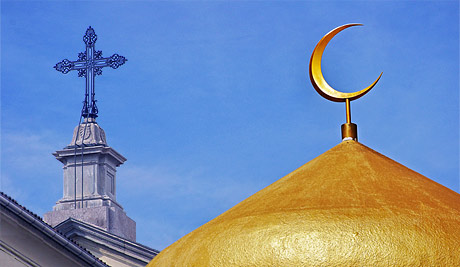Questions of Faith
The question of whether Christians and Muslims worship the same God has been a point of contention among different religious denominations and various scholars. It has been suggested that the sheer disparities theologically and philosophically between both religions indicate that its adherents must be praying to separate deities. It seems, however, that arguments which support differentiating the two aren’t sound.
Both Islam and Christianity, just like Judaism, are monotheistic religions tracing their roots back to Abraham. While Muslims believe that the Bible has been corrupted or altered in some shape or form, they still hold that God revealed his message to the prophets like Moses and Abraham.
The Vatican II document Lumen Gentium makes this clear when it reads: “The plan of salvation also includes those who acknowledge the Creator, in the first place amongst whom are the Muslims; these profess to hold the faith of Abraham, and together with us they adore the one, merciful God, mankind’s judge on the last day.” (16)
Distinction
But while the Church teaches that both religions worship the same God, an important distinction must be made, namely that our conception of God is different. Muslims, for example, don’t believe that Jesus was the Son of God or hold to the doctrine of the Trinity. This doesn’t mean that Muslims aren’t referring to the same God, only that they have a different sense of who God is.
It’s a difficult concept to get your head around, so an analogy would best serve to elucidate the point. Suppose there’s a man called Fred who has two siblings.
One sibling sees him as charming and kind; the other views him as a cold and self-centred. Both siblings conceive of Fred in different ways, but there’s no doubt that they’re definitely referring to the same person.
Likewise, even though Muslims don’t understand God in the same way as Christians, it doesn’t mean they aren’t genuinely directing their prayers to him.
Perspective
The famous Church document on religious unity, Nostra Aetate, lucidly sums up this perspective.
“The Church regards with esteem also The Muslims. They adore the one God, living and subsisting in Himself; merciful and all-powerful, the Creator of heaven and earth, who has spoken to men; they take pains to submit wholeheartedly to even His inscrutable decrees, just as Abraham, with whom the faith of Islam takes pleasure in linking itself, submitted to God.
“Though they do not acknowledge Jesus as God, they revere Him as a prophet. They also honour Mary, His virgin Mother; at times they even call on her with devotion. In addition, they await the Day of Judgment when God will render their deserts to all those who have been raised up from the dead. Finally, they value the moral life and worship God especially through prayer, almsgiving and fasting.” (3)
So, while Muslims and Christians have different conceptions of God, the deity they worship is the same.


 Colm Fitzpatrick
Colm Fitzpatrick

